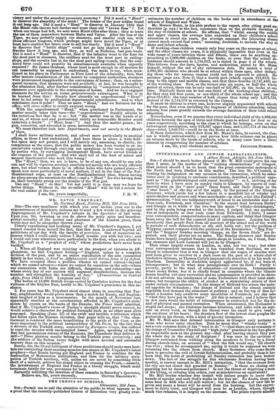HR. DAVID 1711QUHART.
35, Norland Road, Notting Hill, 22d June 1854. Sin—The rare manliness with which you ever incline your ear to the remonstrances of dissidents, induces me to send a few words on the grievous disparagement of Mr. Urquhart's labours in the Spectator of last week. Upon you, Sir, towering as you do above the petty spite and breeches- pocket morality of the scribes and pharisees of the London press, these words may not be altogether thrown away. Utterly repudiating and loathing many of Mr. Urquhart's dogmas, I yet cannot conceal from myself the fact, that this man is endowed beyond all politicians of our day with the faculty of prevision. Out of numerous in- stances which I could easily adduce I shall trouble you with but two ; and I would call your attention more particularly to the first, when you allude to Mr. Urquhart as a "prophet of evil," whose predictions have never been verified.
1. When all England was rejoicing at the prospect of victories in Aff- ghanistan, we find "Urquhart writing—" England, unless by a complete revision of the past, and by an entire repudiation of the acts committed falsely in her name, is fixed in Afghanistan until driven from it by defeat. We have occupied there a position whence we cannot retreat—beyond which we cannot advance—where we cannot fix ourselves on the soil—where our connexions with India are difficult, dangerous, and exhausting—and where every day of our sojourn will augment dissatisfaction, increase the number and strengthen the hostility of foes." (Transactions in Central .48174, from 1834 to 1839. Longman and Co.)
The bodies of 15,000 British troops carved by Cambolee knives for the foul vultures of the Khyber Pass, testify to Mr. Urquhart's prescience in this in- stance.
2. For years has Mr. Urquhart stood almost alone in asserting that Tur- key, singlehanded, would prove more than a match for Russia, and English- men laughed at him as a monomaniac. In the month of November last, apparently startled at the corroboration afforded to Mr. Urquhart's state- ments by events on the banks of the Danube, the Times itself admitted, that if Mr. Urquhart's views of Turkey's strength should prove correct, he would achieve a character for political foresight such as no other man alive
eased. Speaking (June 22) of the swift and terrible retribution which
fallen upon the Russian invaders, that paper tells us, that "the chas- tisement is rendered the more humiliating to the pride of the Czar, as the more important to the political independence of the Po:te, by the fact that a division of the Turkish army, unassisted by European troops, has sufficed to repel the invader with unexampled losses." Again, speaking of the de- feat and ignominious retreat of the Russians, the Thunderer thus delivers it- self—" These glorious results belong to the Turkish arms exclusively; and the soldiers of the Sultan never fought with snore devoted and successful bravery than on this occasion." Surely, Sir, the literal fulfilment of these predictions should make men hesi- tate ere contracting their snarling muscles into sneers at Mr. Urquhart's latest prophecy—that Russia having got England and France to combine for the non of Mahometan institutions, and then for the military emu- pation of Turkish territory, will, unless we are saved by something little short of a miracle, achieve her grand object in crossing the Pruth,—namely, the involvement of England and France in a bloody struggle, which must terminate fatally for one, perchance for both. Earnestly soliciting the insertion of these remarks in Saturday's Spectator,


































 Previous page
Previous page